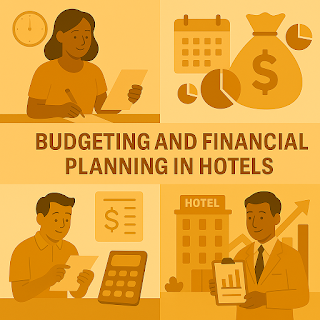Budgeting and Financial Planning in Hotels
Dear All,
Our site https://abhinandanarora.blogspot.com is live. Now we can start Exploring Good Learning for ourselves.
Budgeting and Financial Planning in Hotels
Budgeting and financial planning are fundamental to the successful management of hotel operations. They provide a roadmap for resource allocation, cost control, profitability, and long-term strategic growth.
🧭 Objectives of Hotel Budgeting & Financial Planning
-
Forecast revenues and expenses
-
Optimize profitability
-
Allocate resources efficiently
-
Monitor performance against goals
-
Support investment and expansion decisions
-
Prepare for seasonal fluctuations and contingencies
📊 Types of Budgets in Hotels
| Type of Budget | Purpose |
|---|---|
| Operating Budget | Covers daily revenues and expenses (room sales, payroll) |
| Capital Budget | For large investments (renovations, new equipment, tech) |
| Cash Flow Budget | Tracks inflow/outflow of cash to avoid liquidity issues |
| Departmental Budgets | Budgets for individual departments (F&B, front office) |
| Flexible Budget | Adjusts based on actual business levels (useful in tourism) |
| Zero-Based Budgeting | Justifies all expenses from scratch for each period |
🧠 Key Steps in Hotel Budgeting Process
-
Set Objectives
-
Align financial goals with business strategy (e.g., increase RevPAR by 10%)
-
-
Revenue Forecasting
-
Based on historical data, market trends, occupancy rates, ADR (Average Daily Rate)
-
-
Estimate Expenses
-
Fixed (rent, salaries) and variable costs (utilities, F&B, maintenance)
-
-
Involve Department Heads
-
Encourage accurate and realistic input for their respective areas
-
-
Monitor Seasonal Trends
-
Adjust expectations for high and low seasons accordingly
-
-
Incorporate Contingencies
-
Allocate funds for unexpected events (e.g., equipment failure, pandemics)
-
-
Review and Approval
-
Senior management or ownership evaluates and approves the final plan
-
-
Implementation and Monitoring
-
Track actual performance against budget using regular financial reports
-
📈 Financial Planning Tools and Metrics
| Metric | Purpose |
|---|---|
| Occupancy Rate | Measures room utilization |
| Average Daily Rate (ADR) | Revenue per occupied room |
| RevPAR | Revenue per available room |
| GOP (Gross Operating Profit) | Profit after operational costs are deducted |
| Net Profit Margin | Final profitability after all expenses |
| EBITDA | Earnings before interest, taxes, depreciation, amortization |
| Break-even Analysis | Identifies minimum occupancy needed to cover costs |
🏨 Technology for Financial Management
-
PMS and POS Integration – Tracks sales and expenses in real time
-
Accounting Software – Tools like QuickBooks, M3, Oracle Hospitality
-
Business Intelligence (BI) – Analyzes trends and forecasts demand
-
Cloud-based budgeting platforms – Enable remote collaboration and updates
✅ Benefits of Effective Budgeting and Planning
-
Financial discipline and informed decision-making
-
Ability to attract investors and secure loans
-
Early identification of financial problems
-
Supports pricing strategies and promotional planning
-
Boosts overall operational efficiency and guest satisfaction




Comments
Post a Comment
Friendly & Inviting:
We'd love to hear your thoughts — feel free to share a comment below!
With Moderation Reminder:
Comments are moderated. Your comment will appear once approved.
With Community Guidelines:
Please be respectful and stay on topic. Spam and rude comments will be deleted.